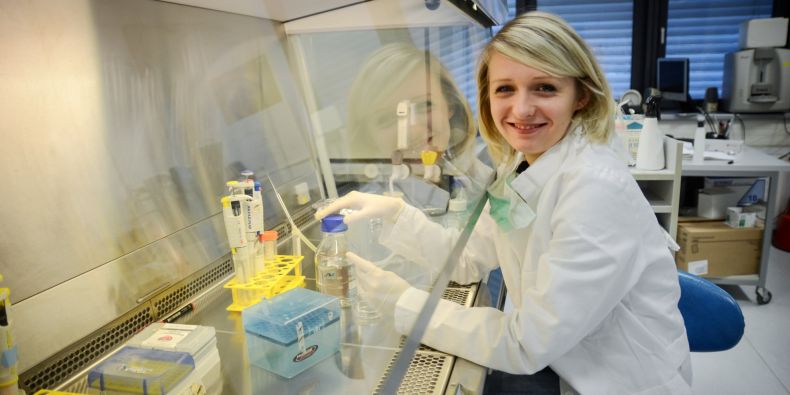Mariama Krutá claims that when she started the doctoral program at the Department of Biology at the Faculty of Medicine at MU, she had very little idea about molecular biology, genetics or tissue cultures. But through hard work, she successfully finished her PhD studies, and in a few months she will start working at a post-doctoral position at the prestigious Derrick Rossi lab of the Harvard University.
“I studied general biology in Nitra with focus on botany and zoology, but I was very interested in molecular biology, so when I found out on the Internet that Brno was offering openings for PhD studies in this field, I decided to go for it,” says Krutá about beginnings of her career.
According to her, it was rather difficult to remain in a laboratory focused on research of stem cells and genetic instability. “During my first year, I was spending ten to fourteen hours a day in the lab in order to catch up and have good results. I had to work hard to become one of those who are really good in their field,” says the molecular biologist.
The young scientist studies embryonic and induced pluripotent stem cells during their long-term cultivation in a lab. That is in the lab environment that within several months the cells start developing mutation that could negatively affect patients in case of potential use of these cells for treatment in the future.
At Harvard, her work will be a bit different, since the laboratory focuses on hematopoietic stem cells, that is cells from which various types of blood cells are formed in the bone marrow. “With age, the hematopoietic system ages as well and the cells are no longer able to be differentiated into specific cell types. The group of Dr. Rossi focuses, among other things, on correcting the damages in DNA in these cells that could impact the differentiation to specific types,” says Krutá.
It is the differentiation of cells and their connection with the genetic instability that Mariama Krutá wants to study at Harvard. Research proposal was also one of the requirements that she had to deal with in order to be accepted by the Harvard laboratory head.
“Groups of this significance do not usually announce openings, so at first, I had to find the head of the lab and send him my CV. When he got back to me, he suggested a Skype interview. A role in my acceptance was also played by a lecture that I organized for his post-doctoral students in the US,” describes Krutá the process of being accepted to this prestigious university.
Originally she was looking for a location somewhere in Europe and Harvard did not even cross her mind. “I discussed my future prospects with my supervisor, Vladimír Rotrekl, and also with the head of the department, Professor Petr Dvořák. They basically persuaded me that I should try to find a group at this prestigious university,” admits Krutá.
She points out that she considers not only the focus of her work, but also the personality of the supervisor very important. “For example my supervisor was helpful to me during my doctoral studies not only as a fellow scientist, but also as a kind person. He was very tolerant and open to my ideas and he was also able to provide constructive criticism of my work,” pointed out Krutá.
She will start working at Harvard in March on a two-year contract. “The contract includes an option of prolonging the stay. People usually stay in this lab for four years. The important factor, of course, will be the results of my work there,” says Krutá. She does not have any further plans for her future but she would like to continue working as a university scientist.
